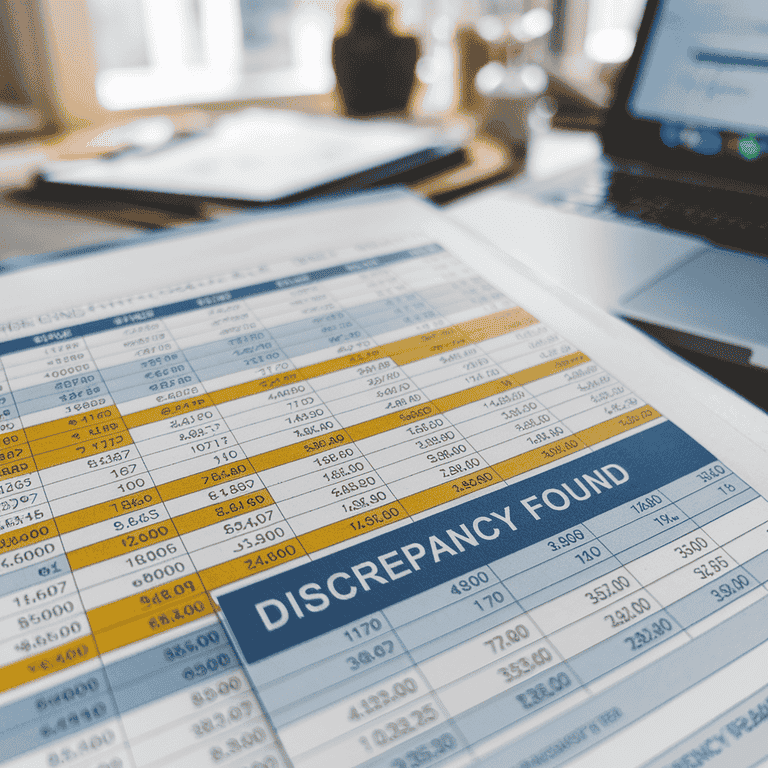Divorce can be emotionally and financially draining, especially when significant assets are at stake. In Nevada, particularly in the bustling city of Las Vegas, divorce cases often involve complex finances, hidden assets, and financial discrepancies that require effective investigation. This is where forensic accounting plays a crucial role.
Forensic accountants are financial detectives who dig deep into financial records to uncover hidden assets, unreported income, and economic mismanagement. They provide critical insights that help ensure a fair division of property and accurate calculations of alimony and child support. For high-net-worth individuals, the expertise of a forensic accountant can be a game-changer, providing clarity and transparency in what is often a murky financial situation.
What is Forensic Accounting in Divorce Cases?
Definition and Scope of Forensic Accounting
Forensic accounting is a specialized field investigating financial records for legal disputes, including divorce. Forensic accountants analyze financial data in divorce cases to identify hidden assets, uncover discrepancies, and provide a clear picture of a couple’s economic situation.
Unlike traditional accountants who focus on preparing financial statements or tax returns, forensic accountants are trained to look beyond the numbers. They use investigative skills to detect irregularities, analyze complex financial transactions, and trace funds that may have been hidden or misreported.
Role of Forensic Accountants in Divorce Proceedings
Forensic accountants play a pivotal role in divorce proceedings by:
- Investigating financial records: They comb through bank statements, tax returns, investment portfolios, and business records to find hidden income or assets.
- Valuing assets and liabilities: They assess the actual value of shared assets, including businesses, real estate, and other investments.
- Identifying financial misconduct: They look for signs of fraudulent behavior, such as underreported income, overstated debts, or hidden transfers.
- Providing expert testimony: They present their findings in court, helping judges and attorneys make informed decisions about asset division, alimony, and child support.
Critical Functions of Forensic Accounting in Divorce
Financial Investigation and Analysis
Forensic accountants dive deep into financial records to uncover the accurate financial picture of a divorcing couple. They examine:
- Bank statements and transactions: To identify patterns, unexplained withdrawals, or transfers.
- Tax returns: To compare reported income with actual income and identify discrepancies.
- Investment accounts: To assess the value of stocks, bonds, and other investments, ensuring they are correctly reported.
- Business records: For those who own businesses, forensic accountants analyze the books to ensure revenue is not underreported or expenses are overstated.
Identification and Valuation of Assets
One of the most critical tasks for a forensic accountant is to identify and accurately value all assets involved in the divorce. This includes:
- Real estate holdings: Homes, rental properties, and land are assessed for current market value.
- Vehicles and luxury items: High-value items like cars, boats, and jewelry are appraised.
- Retirement accounts, such as 401(k)s, IRAs, and pensions, are analyzed to determine their worth and how they should be divided.
- Business interests: Forensic accountants perform detailed business valuations for divorcing spouses who own businesses to establish fair value.
Detection of Hidden Assets and Income Sources
Hidden assets are common in divorce cases, especially in high-net-worth scenarios. Forensic accountants use various techniques to uncover the following:
- Unreported income: Cash businesses, side gigs, or freelance work often lead to unreported earnings.
- Asset transfers: Moving money into offshore accounts or transferring property to friends or family to keep it hidden.
- Shell companies: Using fake or inactive businesses to funnel money away from the marital estate.
Forensic accountants bring transparency to these hidden financial maneuvers, ensuring all assets are on the table during the divorce settlement.

How Forensic Accountants Uncover Hidden Assets
Hidden assets are frequent in divorce cases, especially when significant wealth is involved. Spouses may try to hide money, undervalue assets, or transfer property to avoid sharing it in the divorce. Forensic accountants are skilled at uncovering these tactics and bringing everything to light.
Typical Methods Used to Hide Assets in Divorce Cases
Forensic accountants know where to look because they’ve seen it all. Here are some of the most common ways people try to hide assets during a divorce:
- Cash withdrawals and transfers: Moving money in small amounts over time or making large withdrawals before the divorce.
- Creating fake debt: Claiming they owe money to friends or family, essentially a disguised transfer.
- Undervaluing personal property: Reporting luxury items, such as art or jewelry, at far less than their actual worth.
- Using offshore accounts: Moving assets to foreign banks to keep them out of reach.
- Transferring ownership to others: Putting assets in the names of relatives, friends, or even shell companies.
Techniques Forensic Accountants Use to Trace Hidden Assets
Forensic accountants use investigative skills, technology, and financial knowledge to uncover hidden assets. Here’s how they do it:
Asset Tracing and Analysis
Asset tracing is the process of following the money trail. Forensic accountants look at all available records to see where the money has gone:
- Bank account analysis: Review deposits, withdrawals, and transfers to find unexplained or unusual activities.
- Credit card statements: Identifying luxury purchases or transfers that indicate hidden income or assets.
- Investment accounts: Checking for securities or other investments that may not have been disclosed.
Bank Statement Reviews and Financial Document Examination
Examining bank statements can reveal a lot about someone’s financial behavior. Forensic accountants look for:
- Unusual transactions: Sudden large withdrawals or unexplained transfers to unknown accounts.
- Round-dollar transactions: These can be red flags for cash withdrawals that are not reported.
- Hidden accounts: Finding accounts that were not disclosed in the divorce proceedings.
Investigating Suspicious Transactions and Transfers
Sometimes, what’s not there is just as telling. Forensic accountants investigate:
- Missing income: Comparing tax returns with bank deposits to find unreported earnings.
- Transfers to family or friends: Spotting attempts to move assets out of reach.
- Cash businesses: Looking deeper into businesses that operate mainly in cash makes it easier to underreport income.
Case Studies/Examples of Hidden Assets Discovered in Nevada Divorces
To illustrate how forensic accountants can uncover hidden assets, here are a couple of real-life examples:
- Luxury vehicles under a friend’s name: In one case, a Las Vegas entrepreneur transferred ownership of several high-end cars to a friend to avoid including them in the divorce. A forensic accountant traced the transactions and proved the vehicles were, in fact, marital property.
- Offshore accounts and hidden investments: A high-net-worth individual attempted to hide money in an offshore account. The forensic accountant revealed substantial hidden funds by cross-referencing international transactions and inconsistencies in reported income.

The Role of Forensic Accountants in Financial Discrepancy Investigation
Identifying Financial Discrepancies and Inconsistencies
Divorce often involves conflicting claims about finances. One spouse may argue that income is lower or debts are higher. Forensic accountants are crucial in identifying discrepancies between what is reported and what is reality.
- Income misrepresentation: Review multiple years of financial statements to spot patterns of underreported income.
- Debt inflation: Checking if debts claimed during the divorce are accurate or exaggerated.
- Expense manipulation: Analyzing personal and business expenses to ensure they are not inflated to reduce net worth.
Analyzing Business Valuations and Income Discrepancies
When a spouse owns a business, it can be challenging to determine the actual value. Business owners might manipulate the books to make the company look less profitable. Forensic accountants tackle this by:
- Assessing financial statements: Looking for inconsistencies in revenue and expenses.
- Reviewing cash flow: Ensuring that cash flow statements match actual bank records and reported income.
- Valuing the business: Conducting an independent valuation to determine the business’s actual worth, free from manipulation.
Investigating Underreported Income or Inflated Expenses
Forensic accountants dig into the numbers to spot signs of financial manipulation:
- Side income: Checking for side gigs or freelance work that isn’t reported.
- Personal expenses claimed as business costs: Identifying when personal lifestyle expenses are funneled through a business to reduce reported income.
- Unusual financial behavior: Spotting patterns that don’t align with typical income or spending habits.
Addressing Fraudulent Financial Behavior During Divorce
Fraudulent financial behavior can severely impact divorce outcomes. Forensic accountants are vigilant in spotting:
- Fake loans or debts: Claims of loans that don’t exist or debts that are asset transfers.
- Misuse of funds: Detecting when funds have been siphoned off for personal gain rather than being disclosed in the marital estate.
- Phantom employees: Identifying situations where a spouse may have created fake employees to divert business funds.
Forensic Accounting in High-Net-Worth Divorce Cases
Due to the volume and complexity of the assets involved, high-net-worth divorces are often more complicated. Forensic accountants are essential in these cases, where millions of dollars can be at stake.
Specific Challenges of High-Net-Worth Divorces in Nevada
High-net-worth divorces come with unique challenges that require specialized expertise:
- Complex asset portfolios: High-net-worth individuals often have a diverse range of assets, including real estate, stocks, businesses, and luxury items. Identifying and valuing these assets can be difficult.
- Multiple income sources: Income might come from various places like investments, businesses, or royalties, making it harder to get a complete financial picture.
- Sophisticated financial tactics: Wealthy individuals may use trusts, shell companies, or offshore accounts to shield assets from divorce proceedings.
- Valuation of private businesses: Determining the value of privately owned businesses, especially when financials are opaque or manipulated, requires a keen eye.
Common Financial Complexities in These Cases
Wealthy divorces often involve complexities beyond the standard marital home and bank accounts. Here are some areas that often require forensic accounting:
- Investment portfolios: Stocks, bonds, and mutual funds can be spread across various accounts and sometimes hidden.
- Retirement accounts: Valuing pensions, 401(k)s, and other retirement plans accurately are crucial, especially when these assets have penalties for early withdrawal.
- Real estate holdings: Multiple properties, including vacation homes, rental properties, and international real estate, complicate asset division.
- Luxury assets: Items like art collections, antiques, yachts, and cars can be challenging to value and easy to hide.
How Forensic Accountants Address Complex Asset Structures
Forensic accountants use detailed analysis and specialized techniques to handle the financial intricacies of high-net-worth divorces:
- Business valuations: Accountants assess the actual value of private businesses by analyzing financial statements, cash flow, and market conditions.
- Tracing investments: They look into complex investment vehicles, including those that might not have been disclosed.
- Assessing trusts and estates: Trusts can shield assets, but forensic accountants can uncover their true purpose and value.
- Luxury asset appraisal: Accountants work with appraisers to ensure high-value items are appropriately valued and included in the marital estate.

Forensic Accounting and Divorce Finances
In a divorce, financial clarity is critical. Forensic accounting ensures that finances are accurately assessed, which helps with fair asset division, alimony, and child support decisions.
Division of Marital Property and Financial Responsibilities
One of the primary roles of a forensic accountant in divorce is to ensure that the division of property is fair and just:
- Identifying marital vs. separate property: Forensic accountants help determine what belongs to the marital estate and what is considered separate property.
- Assessing liabilities: Not just assets but debts are scrutinized to ensure they are pretty divided.
- Fair valuation: Ensuring all tangible or intangible assets are valued correctly to prevent one spouse from getting an unfair advantage.
Impact of Forensic Findings on Alimony and Child Support Decisions
The financial data uncovered by forensic accountants directly impacts alimony and child support calculations:
- Accurate income assessment: Ensuring that all sources of income are considered, including bonuses, dividends, and rental income.
- Lifestyle analysis: Understanding the couple’s standard of living during the marriage helps set appropriate alimony levels.
- Child support considerations: Accurately valuing income ensures that child support reflects the actual financial capabilities of both parents.
Valuation of Shared Assets and Liabilities
Not all assets are straightforward cash amounts. Forensic accountants evaluate a wide range of assets to provide a complete financial picture:
- Real estate: Assessing the current market value of homes, rental properties, and land.
- Business interests: Evaluating private business ownership often requires adjusting for market trends and future earning potential.
- Debt obligations: Ensuring liabilities, such as mortgages, loans, and credit card debts, are assessed and divided.
Legal Implications of Forensic Accounting in Nevada Divorce Law
In Nevada, divorce laws are designed to ensure equitable distribution of marital assets. Forensic accountants are vital in providing the court with detailed financial evidence.
Overview of Nevada Divorce Laws Relevant to Asset Division
Nevada is a community property state, meaning assets acquired during the marriage are generally split 50/50. However, when one spouse hides assets or misrepresents their value, things get complicated. Forensic accountants help by:
- Providing clarity on shared vs. separate assets: Ensuring only marital property is divided while protecting separate assets.
- Uncovering hidden assets: Find assets one spouse might have tried to keep off the books.
- Ensuring accurate valuations: Presenting the actual value of assets to the court influences how they are divided.
How Forensic Accounting Findings Influence Court Decisions
Forensic accountants’ reports often serve as crucial evidence in court:
- Supporting equitable distribution: Judges rely on the accountant’s findings to make informed decisions about asset division.
- Adjusting alimony and support: Financial investigations can reveal hidden income or assets that change support obligations.
- Detecting fraud and misrepresentation: Courts take financial dishonesty seriously, and forensic findings can lead to penalties or adjusted rulings.
Legal Standards for Evidence Presented by Forensic Accountants
Forensic accountants are often called expert witnesses in divorce cases. Their findings must meet specific legal standards:
- Admissibility of evidence: Forensic accountants must ensure their reports are thorough, well-documented, and based on reliable methods to be admissible in court.
- Expert testimony: Accountants may need to explain their findings in court, breaking down complex financial data in a way that judges and attorneys can understand.
- Compliance with legal procedures: Forensic accountants must follow all legal and ethical guidelines to ensure their work stands up in court.

Working with a Forensic Accountant: What to Expect
Hiring a forensic accountant can seem daunting, primarily if you’ve never worked with one. However, understanding what to expect can help you feel more prepared and confident.
Steps to Hire a Forensic Accountant in a Nevada Divorce Case
Finding the right forensic accountant is crucial. Here are the key steps involved:
- Get recommendations: Start by asking your attorney for recommendations. Lawyers often have trusted forensic accountants with whom they work regularly.
- Check qualifications: Ensure the accountant has experience in divorce cases, particularly in Nevada. Look for certifications like Certified Public Accountant (CPA) or Certified Fraud Examiner (CFE).
- Conduct interviews: Meet with potential accountants to discuss your case. Ask about their experience, methods, and how they plan to approach your specific situation.
- Review fees: Understand their fee structure. Some charge hourly rates, while others may have a flat fee. Ensure their services fit within your budget.
What Documents and Information Are Typically Required
Once you hire a forensic accountant, they must access various documents to conduct their investigation. Here’s a list of commonly required documents:
- Bank statements: Personal and joint accounts for several years to spot trends and anomalies.
- Tax returns: Personal and business returns to assess reported income and identify discrepancies.
- Investment statements: Portfolios, retirement accounts, and other financial investments.
- Business financial records: Profit and loss statements, balance sheets, and cash flow statements for owned businesses.
- Credit card statements: To identify spending patterns and possible hidden assets.
- Property records: Deeds, mortgage statements, and valuations for real estate holdings.
Cost Considerations and Budgeting for Forensic Accounting Services
Forensic accounting can be costly, especially in complex cases. However, the investment is often worth it when significant assets are involved. Here’s what you need to know about costs:
- Hourly rates: Forensic accountants typically charge hourly rates, ranging from $150 to $500 per hour, depending on their experience and the case’s complexity.
- Retainers: Many accountants require a retainer upfront. This acts as a down payment on their services.
- Final costs: The total cost will depend on the depth of the investigation. Simple cases may cost a few thousand dollars, while complex, high-net-worth cases can run into tens of thousands.
- Value of accurate findings: While costs can be high, uncovering hidden assets or ensuring a fair settlement can save or gain much more in the long run.
The Benefits of Using Forensic Accounting in Divorce
Forensic accounting isn’t just about catching a cheating spouse or finding hidden money. It provides numerous benefits that can significantly affect the outcome of your divorce.
Ensuring Fair Asset Division
One of the most significant advantages of forensic accounting is ensuring that all assets are accounted for and fairly divided:
- Complete transparency: Forensic accountants clarify the financial picture, guaranteeing both parties know what is at stake.
- Accurate valuations: Proper valuations prevent one spouse from getting more than their fair share.
- Identification of all assets: Hidden accounts, undisclosed investments, or undervalued properties are highlighted.
Protecting Financial Rights During Divorce Proceedings
Forensic accountants act as your financial advocate, ensuring your rights are protected:
- Preventing fraud: They can spot financial misbehavior that could unfairly impact your settlement.
- Strengthening your case: Their findings provide solid evidence that can be used in negotiations or court, giving you a stronger position.
- Addressing disputes: They help resolve financial disagreements by providing an objective analysis.
Reducing the Risk of Financial Manipulation or Fraud
Divorce can bring out the worst in people, especially when money is involved. Forensic accounting reduces the risk of financial manipulation:
- Spotting discrepancies: Accountants are trained to find inconsistencies the average person might miss.
- Preventing asset hiding: Their thorough approach ensures all assets are accounted for, reducing the chance of deceit.
- Setting a clear record: Their detailed reports create a comprehensive financial record that courts can rely on.

Challenges and Limitations of Forensic Accounting
While forensic accounting provides many benefits, it’s essential to understand its limitations and potential challenges.
Potential Hurdles in the Financial Investigation Process
Forensic accountants may face various challenges during their investigation:
- Uncooperative spouses: If one spouse refuses to provide documents or misleads the accountant, it can slow down the process.
- Complex financial structures: Sophisticated asset structures like offshore accounts or hidden investments require extra time and effort to unravel.
- Incomplete data: Missing or incomplete records can hinder a complete financial picture, making it difficult to provide accurate findings.
Legal and Ethical Considerations
Forensic accountants must adhere to strict legal and ethical guidelines to ensure their findings are credible and admissible in court:
- Confidentiality: Accountants must keep all information confidential, only sharing it with authorized parties like your attorney.
- Objectivity: They must remain impartial, providing findings based solely on the data, without bias toward either party.
- Compliance with court standards: Evidence collected must comply with legal standards to be used effectively in court.
Time and Cost Factors in Complex Divorce Cases
The deeper the investigation, the more time and money it will cost:
- Time-intensive: Forensic accounting investigations can be lengthy, especially in complex cases with numerous assets.
- High costs: The detailed nature of their work and the need for accuracy mean that costs can add up quickly.
- Balancing cost vs. benefit: It’s essential to weigh the potential financial benefits of forensic accounting against the upfront costs, especially in cases where the suspected hidden assets may not justify the expense.

Breaking It All Down
Forensic accounting plays a vital role in divorce cases, especially in Nevada, where high-net-worth divorces often involve complex finances. By uncovering hidden assets, identifying financial discrepancies, and providing precise, objective analyses, forensic accountants help ensure a fair and transparent division of marital property. Their work can be the difference between a just settlement and one that leaves one party unfairly disadvantaged.
The insights provided by forensic accountants don’t just impact the immediate outcome of the divorce. They also protect your long-term financial future by disclosing and appropriately valuing all assets. Whether you’re dealing with a spouse trying to hide assets or need a clear picture of your financial situation, a forensic accountant can be your strongest ally in divorce.

Frequently Asked Questions
What Exactly Does a Forensic Accountant Do in a Divorce?
A forensic accountant investigates the financial aspects of a divorce. They dig through records to uncover hidden assets, unreported income, or financial discrepancies. They help ensure that all financial information is accurate, providing valuable evidence for fair asset division and support calculations.
How Do I Know If I Need a Forensic Accountant?
If you suspect your spouse is hiding assets or underreporting income, or if your divorce involves complex financial matters, you likely need a forensic accountant. High-net-worth divorces, business ownership, and significant investments are all situations where forensic accounting can be beneficial.
How Much Does Forensic Accounting Cost?
The cost of forensic accounting varies depending on the complexity of your case. Forensic accountants typically charge hourly rates that range from $150 to $500 per hour. The total cost can vary widely, but expect to pay several thousand dollars for a detailed investigation.
How Long Does a Forensic Accounting Investigation Take?
The time it takes for a forensic accounting investigation depends on the complexity of the case and the availability of financial documents. Simple cases may be resolved in a few weeks, while more complex cases involving hidden assets or business valuations could take several months.
Can Forensic Accountants Testify in Court?
Yes, forensic accountants often serve as expert witnesses in court. They present their findings, explain complex financial matters, and provide evidence that can significantly impact the judge’s decisions on asset division, alimony, and child support.
Will My Spouse Know I've Hired a Forensic Accountant?
In many cases, yes. Since forensic accountants need access to shared financial documents, your spouse will likely become aware of their involvement. However, this transparency can work in your favor, encouraging honesty and full disclosure from both sides.
What Happens If Hidden Assets Are Discovered?
If hidden assets are discovered, they can be included in the divorce settlement, ensuring a fair division. Courts do not look kindly on spouses who attempt to hide assets, and the discovery of such behavior can influence rulings on asset division, alimony, and even legal fees.
Are Forensic Accountants Only for High-Net-Worth Divorces?
While forensic accountants are often associated with high-net-worth divorces, they can be valuable in any divorce where financial discrepancies or hidden assets are suspected. Forensic accounting can ensure an accurate and fair financial settlement, even in moderate-income cases.

Additional Resources for You from The Rosenblum Allen Law Firm.
If you’re navigating the complexities of divorce, remember that you don’t have to do it alone. Our lead attorney, Molly Rosenblum Allen, Esq., has developed a range of resources tailored to help you during this challenging time. These articles offer guidance, support, and answers to many of the pressing questions you may have about divorce in Nevada:
- Las Vegas Divorce Attorney: Understand your legal options and how our firm can help you through every stage of your divorce.
- Nevada Divorce: A comprehensive guide to the divorce process in Nevada, including state-specific laws and what to expect.
- Surviving Divorce: Tips and strategies to help you cope emotionally and financially during and after your divorce.
- What Happens If You Don’t Sign Divorce Papers: Learn about the legal consequences and next steps if one party refuses to sign divorce documents.
- Do I Need an Attorney to Get a Divorce: Insights into the importance of legal representation and when hiring an attorney is crucial.
- What is a Collaborative Divorce: Explore an alternative approach to traditional divorce that focuses on cooperation and negotiation.
- How to Win a Divorce: Strategies to protect your interests and secure a favorable outcome in your divorce.
- Switching Lawyers During Divorce: Guidance on what to consider if you feel your current representation isn’t meeting your needs.
- How Long Does a Divorce Take in Nevada: An overview of the timeline and factors that can affect the length of your divorce process.
- High Conflict Divorce: Advice on managing and navigating the challenges of a contentious divorce.
- Questions to Ask a Divorce Lawyer: Key questions to help you choose the right attorney and understand the divorce process better.
These resources are designed to provide valuable insights and empower you with the information you need during this difficult time. Molly Rosenblum Allen, Esq. and our team are dedicated to helping you make informed decisions every step of the way.

Offsite Resources for You
American Academy of Matrimonial Lawyers (AAML): This organization provides valuable resources and information on all aspects of family law, including divorce, asset division, and financial investigations.
National Association of Divorce Professionals (NADP): NADP connects professionals who help divorcing couples, including forensic accountants, divorce attorneys, and financial advisors, offering guidance on the divorce process.
American Institute of Certified Public Accountants (AICPA): AICPA offers insights into forensic accounting practices, including resources on financial fraud and asset tracing, which are particularly useful during divorce.
Institute of Divorce Financial Analysts (IDFA): The IDFA specializes in the financial aspects of divorce, offering resources on forensic accounting, asset division, and financial planning post-divorce.
Association of Certified Fraud Examiners (ACFE): ACFE provides extensive information on fraud prevention, detection, and investigation, making it a valuable resource for understanding how forensic accountants uncover hidden assets.
Women’s Law Center: Offers a range of resources and support for women going through divorce, including financial advice, legal guides, and access to experts who can help navigate complex financial situations.

A Special Message from Our Lead Attorney, Molly Rosenblum Allen, Esq

Thank you for taking the time to read our resources. I hope you found the information helpful as you navigate this challenging time. Divorce can be overwhelming, especially when financial complexities are involved, but you don’t have to go through it alone. My team and I are here to provide the support and expertise you need to move forward with confidence.
If you’re ready to take the next step, give us a call at (702) 433-2889. Let’s get the ball rolling on your situation and work together to protect your rights and secure your future.
Warm regards,
Molly Rosenblum Allen, Esq.
The Rosenblum Allen Law Firm







